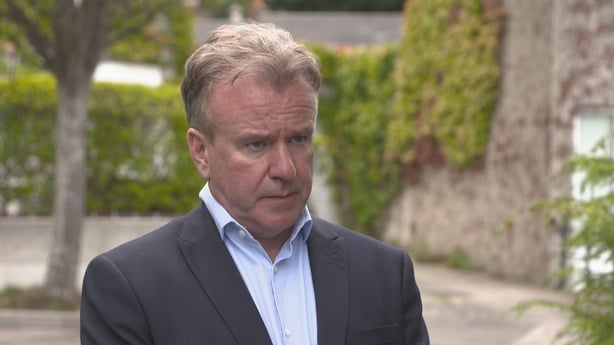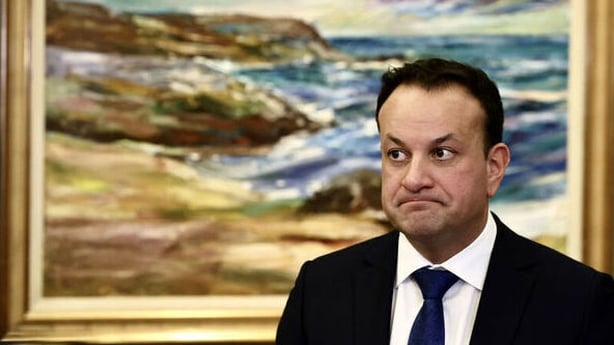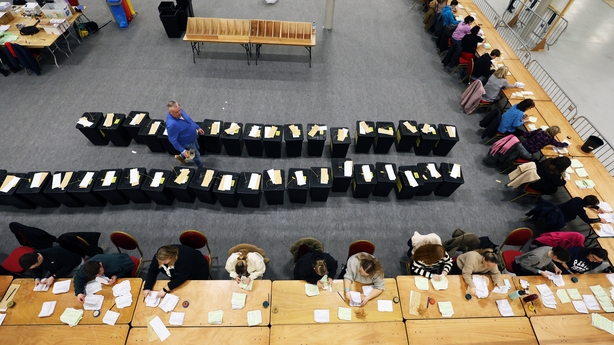There were no Government representatives present at Dublin Castle last night when the results were declared for the resounding referendum defeats.
Instead, it was left to small gatherings in a near empty room to hold low-key, quiet celebrations as returning officer Barry Ryan read out the verdicts of the nation.
Independent Senator, Tom Clonan who had ploughed a lonely furrow in calling for a No vote in the earlier days of the Care referendum campaign, was there.
Also present were members of the Equality Not Care group who had argued that the proposal sought to confine people with disabilities to being cared for at home.

Just two hours earlier, a handful of mostly Independent Senators and TDs - bearing the hallmarks of a political grouping in the making - awkwardly huddled around to clap in the No result to the Family amendment.
It was no surprise that the Government might want to avert its eyes: from where they were, it certainly wasn't pretty.
Earlier in the day the Taoiseach addressed the media. Standing in front of an oil painting depicting choppy water, he tried to brush off the wider political and electoral significance.
There were 11 previous referendum defeats, he said, and none resulted in the fall of a government. And there was no bounce either from the resounding Yes votes for Repeal and Marriage Equality.
Minister Roderic O'Gorman also sought to downplay the wider significance for the Coalition. While the Government simply didn't manage to persuade people, he said, issues were raised in the campaign that were "incorrectly interpreted".

But there is no glossing over the fact that this is a setback. The Coalition finds itself with a headwind against it, as it faces into an electoral cycle with the European and local elections in June and a general election at least within the year.
Government TDs (some of whom had doubts about the wisdom of this whole enterprise) are pondering the sheer inability of their parties to go out and communicate and sell a message to an electorate that it now appears remote from.
The sense of disconnect will was particularly apparent in rural Ireland. As the campaign progressed, it became clear to many local representatives for Fianna Fáil and Fine Gael that the term "durable relationship" was causing concern for farmers around implications for inheritance.
Minister O'Gorman met the ICMSA in the last week of campaigning in an effort to allay those fears. They remained unconvinced and on the day there was a rejection by 71.3% in Kerry, 75% in Mayo, 72% in Galway East and a massive 80% in Donegal.
There was no great comfort for opposition parties either. All bar Aontú backed a Yes-Yes.
Labour's Ivana Bacik accused the Government of a lacklustre campaign.
Sinn Féin's Mary Lou McDonald said the Government had gone on a "solo run" when it came to devising the wordings.

But her party too has found itself on the wrong side of a voting demographic it would have traditionally considered its stronghold, in another sign that it's losing its "anti-establishment" mantle.
There are many strands to these defeats and voters who - contrary to conventional perception - did engage with these issues at least in the final weeks, said No for a myriad of reasons.
But there will be nervousness among all the main parties that they misread them. An electorate that has proven to be increasingly volatile in post-crash elections, is now more unpredictable and hard to read than ever.
Ten years ago, Enda Kenny said his government had been dealt a "wallop" following the defeat of the referendum to abolish the Seanad. What happened yesterday was a far harder hit.
With a new record set for the biggest rejection of any referendum since the Constitution was written, this was more of a clobbering at Dublin Castle.
The Government might have run from its gates as soon as they could manage, but they can't hide from the many questions that will follow the outcome.






